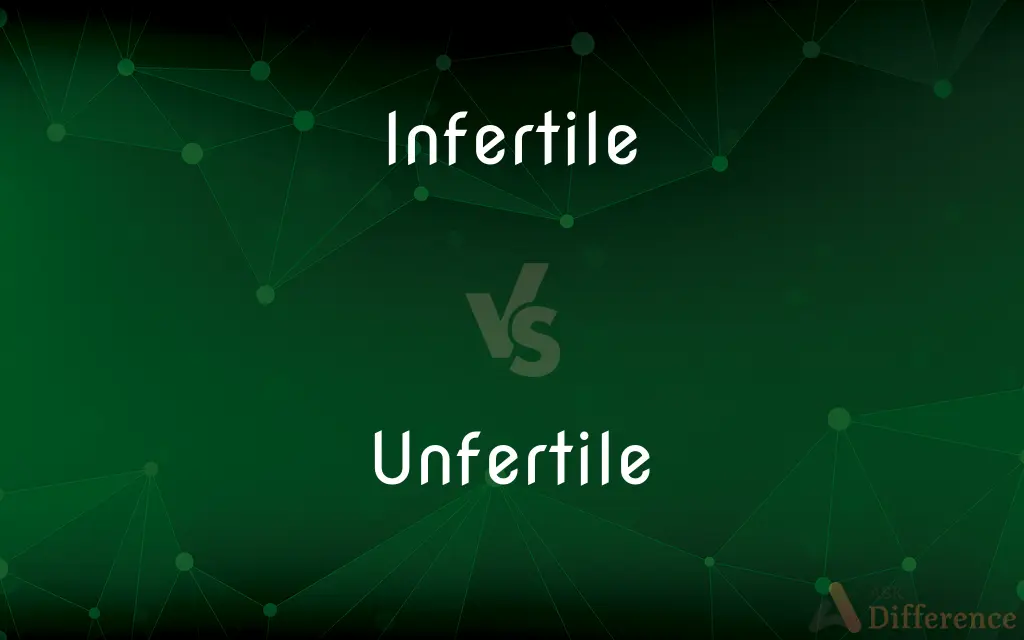Infertile vs. Unfertile — What's the Difference?
Edited by Tayyaba Rehman — By Fiza Rafique — Updated on March 27, 2024
Infertile primarily refers to the inability to reproduce or conceive after a year of regular, unprotected intercourse, while unfertile is less commonly used in medical contexts and often applies to soil or land that cannot sustain plant life.

Difference Between Infertile and Unfertile
Table of Contents
ADVERTISEMENT
Key Differences
Infertility can affect both men and women and is a medical condition that has various causes, ranging from genetic issues to lifestyle factors. In contrast, unfertile is typically not used to describe human reproductive capabilities and is more often associated with agriculture or gardening, describing land that lacks the necessary nutrients or conditions to support plant growth.
The term infertile is widely recognized and used in the medical community, supported by research and diagnostic criteria to define and address the challenges faced by individuals or couples unable to conceive. On the other hand, unfertile, when applied outside of human fertility, does not carry the same depth of scientific understanding or medical intervention strategies.
When discussing infertility, there are specific treatments and interventions, such as fertility drugs, surgery, or assisted reproductive technologies like IVF, aimed at overcoming or mitigating the underlying issues. Conversely, improving unfertile land might involve adding nutrients, adjusting pH levels, or implementing irrigation systems to create a more conducive environment for plant growth.
The psychological and emotional impacts associated with infertility can be significant, often requiring support and counseling for individuals or couples. The term unfertile, related to land, does not evoke the same personal or emotional response, reflecting its more general and less clinically focused usage.
Comparison Chart
Definition
Unable to reproduce or conceive due to biological reasons.
Lacking in nutrients or conditions necessary for growth.
ADVERTISEMENT
Context
Biological, particularly referring to humans and animals.
Agricultural, referring to soil or land.
Solutions
Medical treatments, assisted reproductive technologies.
Soil management, fertilization, sustainable farming practices.
Reversibility
Can sometimes be temporary or reversible.
Improvement requires long-term environmental management.
Emotional Impact
Often has a significant emotional and psychological impact.
Primarily concerns economic and productivity aspects.
Compare with Definitions
Infertile
Unable to conceive or produce offspring due to biological reasons.
The couple explored various treatments for infertility.
Unfertile
Refers to land or soil lacking nutrients necessary for plant growth.
The unfertile land required extensive treatment before it could be used for farming.
Infertile
Often used in medical contexts to describe reproductive challenges.
Infertility treatments have advanced significantly in recent years.
Unfertile
Indicates a need for environmental or agricultural intervention.
Adding compost improved the condition of the unfertile soil.
Infertile
Referring to a condition where producing life is impossible.
Certain medical conditions can render an individual infertile.
Unfertile
Often used in agricultural contexts to describe poor soil quality.
Unfertile soil makes it difficult to achieve a good harvest.
Infertile
Can imply a temporary or treatable state.
Some forms of infertility can be addressed with medication or surgery.
Unfertile
Can involve long-term management strategies to improve productivity.
Crop rotation is a practice used to prevent soil from becoming unfertile.
Infertile
Associated with emotional, physical, and social challenges.
Dealing with infertility can be emotionally taxing for many couples.
Unfertile
Not fertile.
Infertile
Not capable of initiating, sustaining, or supporting reproduction.
Unfertile
Not fertile; infertile; barren.
Infertile
Not fertilized and hence incapable of growing and developing
Infertile duck eggs.
Unfertile
Incapable of reproducing;
An infertile couple
Infertile
Not capable of sustaining crops or vegetation
Infertile land.
Infertile
Unproductive or producing little
A path of research that proved infertile.
Infertile
Not fertile.
Infertile
Not fertile; not productive; barren; sterile; unable to propagate its kind; as, an infertile soil; an infertile hybrid; - of living things and of soil or land.
Infertile
Incapable of reproducing;
An infertile couple
Common Curiosities
How is infertility treated?
Treatments may include medication, surgery, assisted reproductive technologies, and lifestyle changes.
Why is some soil considered unfertile?
Soil may lack essential nutrients, have poor water retention, or suffer from contamination, making it unfertile.
Can both men and women be infertile?
Yes, infertility can affect both genders due to various biological and health-related reasons.
Can infertile land be made productive again?
Yes, with proper soil management, fertilization, and sustainable practices, unfertile land can be revitalized.
What are common indicators of unfertile soil?
Poor plant growth, discoloration of vegetation, and soil testing can indicate unfertility.
Can lifestyle changes improve fertility?
In some cases, changes in diet, exercise, and reducing stress can improve fertility.
Is infertility always permanent?
Not always; some forms are temporary or reversible with medical intervention or lifestyle adjustments.
What technologies assist with overcoming infertility?
Technologies include in vitro fertilization (IVF), intracytoplasmic sperm injection (ICSI), and fertility drugs.
Are there environmental causes for soil becoming unfertile?
Yes, environmental factors like overfarming, pollution, and erosion can lead to soil infertility.
What causes infertility in individuals?
Infertility can result from genetic factors, health conditions, environmental influences, or lifestyle choices.
What are the emotional impacts of infertility?
Infertility can lead to feelings of frustration, sadness, and stress, affecting individuals and couples.
How do farmers improve unfertile land?
Through techniques like fertilization, crop rotation, and the use of organic matter.
Is there a difference in the emotional impact of dealing with infertile land versus infertility?
Yes, dealing with infertility often has a deeper emotional and psychological impact compared to managing unfertile land.
What role does genetics play in infertility?
Genetic abnormalities or predispositions can significantly contribute to an individual's infertility.
How do environmental conditions affect fertility in humans and soil?
Environmental pollutants and chemicals can adversely affect human reproductive health and soil fertility.
Share Your Discovery

Previous Comparison
Virus vs. Virion
Next Comparison
Orangutan vs. GorillaAuthor Spotlight
Written by
Fiza RafiqueFiza Rafique is a skilled content writer at AskDifference.com, where she meticulously refines and enhances written pieces. Drawing from her vast editorial expertise, Fiza ensures clarity, accuracy, and precision in every article. Passionate about language, she continually seeks to elevate the quality of content for readers worldwide.
Edited by
Tayyaba RehmanTayyaba Rehman is a distinguished writer, currently serving as a primary contributor to askdifference.com. As a researcher in semantics and etymology, Tayyaba's passion for the complexity of languages and their distinctions has found a perfect home on the platform. Tayyaba delves into the intricacies of language, distinguishing between commonly confused words and phrases, thereby providing clarity for readers worldwide.














































